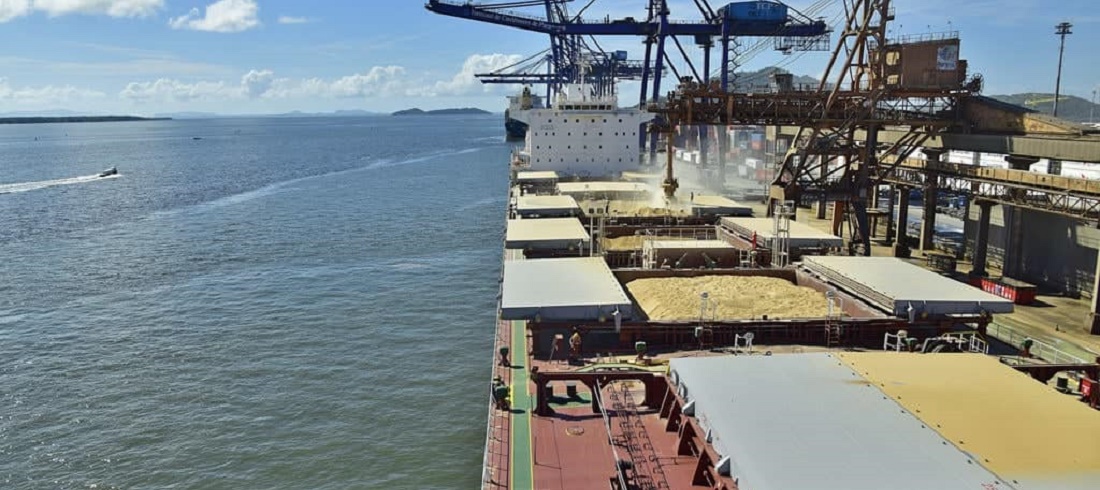
Movements in the Ports of Parana increases
Jul, 11, 2019 Posted by datamarnewsWeek 201929
In June, the Ports of Paranaguá and Antonina handled nearly 5.3m tons of cargo. The volume is 15% higher than that registered in the same month of 2018, when they were 4.6m tons. The figures were released by the public company Ports of Paraná.
Almost 68% of this total was exported, with growth in grain movements. “The most significant increases in handling are in the solid export bulk, and last year, in June, there were just over 3.1m tons of solid bulk”, explains director of operations, Luiz Teixeira da Silva Júnior.
“Maize made a big difference, we did not move it last year, but this year we exported more than 795 thousand tons in June,” he added.
Almost 2.5m tons of soybeans (as grain and bran) and maize were moved in June this year. This total is 29% higher than that recorded in the same period last year, when it was 1.9m.
Oil derivates
Another highlight was the export of petroleum products. These products showed an increase of 84%. Last month, 58.7 thousand tons of petroleum were exported; last year, in the same 30 days, 31.9 thousand tons were exported.
On the other hand, the import of petroleum products decreased by 22%. In June 2018, 301,517 tons were imported by the Port of Paranaguá. This year, June, 233,820 tons.
Fertilizers
Of fertilizer, 929,688 tons were imported in June 2019, against 865,640 tons in the previous year.
Only the port of Antonina recorded a 143% increase in the handling of fertilizer. In June of this year, 35,482 tons of fertilizer were imported, while last year only 14,585 tons.
Antonina
In general, movement in the Port of Antonina registers that June was 119% busier this year. In total, this year there were 79,063 tons of products transported (sugar and non-transgenic soybean bran for export and fertilizers for import). In June 2018, the monthly movement was of 36,117 tons.
General load
In the Port of Paranaguá, the highlight was general cargo operations, which recorded a 12% increase: 973,068 tons in June 2019, compared to 872,387 tons in June 2018.
The increases were most significant in container volumes, which grew by 29%. There were 76,245 units moved in June 2019, and 58,967 units in June last year.
Vehicles were also discharged. The 10,650 units exported and imported in June this year, represent 9% more than the 9,770 units registered in June 2018.
Trucks
In June alone, 42,407 trucks passed through the Screening Court of the Port of Paranaguá. The volume is almost 6% higher than that of last year June.
1st Semester
In the first six months of 2019, the ports of Paraná already had a volume of more than 25m tons of cargo. Of this total, more than 63.2% – that is, almost 15.8m tons – were exports and the remainder, a little more than 9.2m tons, were imports.
Considering the semester, however, the movement of 2019 fell 6% compared to last year.
Mega-operation against drug trafficking
Still on the Port of Paranaguá, the administration of the Ports of Paraná, the Military Police and Federal Police have integrated into a mega-operation against drug trafficking. On Tuesday night, 09/07, a group of 20 men, members of the Port Guard, military, and federal agents, with sniffer dogs, surveyed about 109 vehicles that left the terminal for Africa.
According to the head of the Port Security Administrative Unit (UASP), Major César Kamakawa, the action is a response to increased arrests of shipments at the Paranaguá Container Terminal (TCP). “Scanning technology and equipment, coupled with constant surveillance work and the Federal Internal Revenue Service, have caused drug arrests to increase by 13 times this year,” he said.
Administrative changes have also aided in the greater security of the bonded areas. “A new service order, which deals with the Port Guard, directs the patrol teams at the dock to more effectively approach the vehicles and people that access the port area, with badge identification and other documentation as well as inspections of the vehicles and cabins of the trucks “, emphasizes the head of UASP.
-
Ports and Terminals
Mar, 27, 2019
0
Cargo handling at Antonina up 180% in the first two months of 2019
-
Ports and Terminals
Jun, 06, 2019
0
Paranaguá Port to renovate pier dedicated to inflammable goods
-
Ports and Terminals
Jul, 12, 2019
0
Antaq postpones date of port area auctions
-
Trade Regulations
Jul, 25, 2019
0
Petrobras to supply fuel to Iranian ships, says Toffoli



